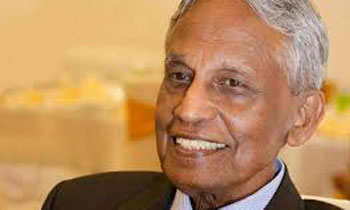Reply To:
Name - Reply Comment
 A mechanism for reparations, another major component of the UNHRC Resolution adopted in 2015, is to be presented to Parliament next month, Chairman of the Committee appointed to set up the mechanism and Secretary to the President Austin Fernando said today.
A mechanism for reparations, another major component of the UNHRC Resolution adopted in 2015, is to be presented to Parliament next month, Chairman of the Committee appointed to set up the mechanism and Secretary to the President Austin Fernando said today.
The paper submitted for Cabinet approval a little over two weeks ago was now before the legal draftsman to ensure its Constitutionality, Fernando said at an event held in Colombo.
“We hope to present the bill to Parliament soon,” he said.
Speaking of the Government’s efforts at reconciliation, Fernando said that infrastructure alone was insufficient if the country was to be successful in its efforts.
“It is not just the diplomats and the politicians who should work for this it has to be everyone,” he said.
The event held at the Taj Samudra Hotel launched a multifaceted programme supporting the reconciliation programme in Sri Lanka. The Rs. 2.7 billion project aims to strengthen institutions at national and sub-national levels as well as promote public engagement in policymaking.
Implemented by the Deutsche Gesellschaft für Internationale Zusammenarbeit (GiZ) and the British Council, the project will be a collaborative effort between the Ministry of Co-existence, Dialogue, and Official Languages, the Office for National Unity and Reconciliation (ONUR), as well as other relevant line Ministries and civil society organizations over four years.
The primary focus of the programme is to track progress on national reconciliation, facilitate learning and strengthen institutions at a national and sub-national level as well as promote public engagement in policymaking.
The programme will contribute to dealing with the past memorialization, strengthening mental health and psychosocial care, and using art and culture as a medium to promote reconciliation.
As a means to help address challenges identified by the Government of Sri Lanka, the programme will lay emphasis on reducing language barriers in order to provide better public services. Some of the key outputs of the programme is a mobile museum and theatre in 35 locations reaching up to 350,000 people, 6,000 clients accessing mental health and psychosocial support services, a minimum of 300 media personnel and cultural actors trained in arts and culture, aiming to reach a minimum audience of 4-5 million, 1,200 public officers receiving language training, including the Police, court officials and health workers. (Nabeela Hussain)